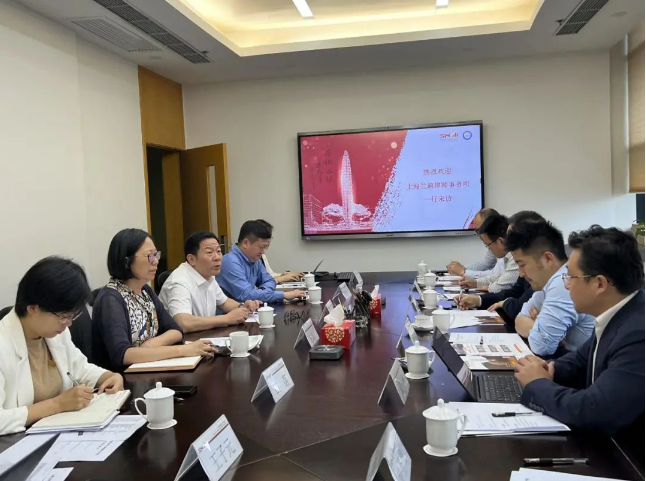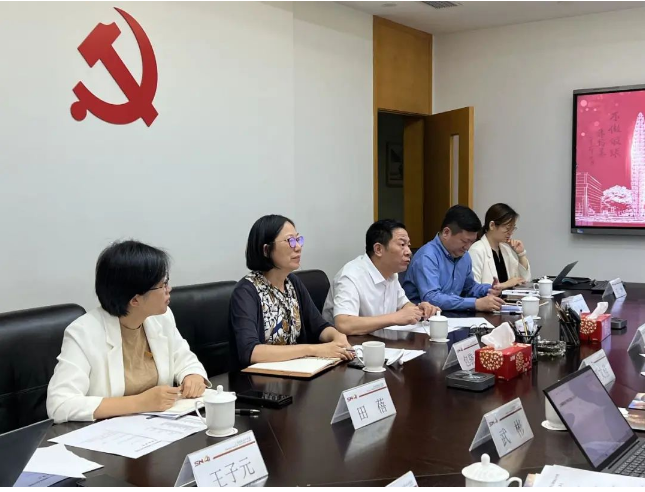Translator:Wang Yichun
On July 20, Shanghai National Accounting Institute (SNSI) and Shanghai Landing Law Offices (Landing) conducted an in-depth roundtable discussion on the collaboration between 'Finance, Accounting and Law'. This discussion was carried out in a 'sharing + interactive' format, promoting cross-industry and cross-disciplinary knowledge exchanges, and building a bridge between universities, law firms and talents.

Representing the SNSI at the meeting were the Secretary of Party Committee Zhang Feng, the Discipline Inspection Commission Secretary Bao Xiaowen, Vice President Zhang Gexing, the Cooperative Projects Department Director Tian Bei, the Deputy Director of the Academic Affairs Department Shi Kun, and Wang Ziyuan. Landing was represented by Executive Director Yin Jun, Senior Partners Zhou Wenjia, Liu Zhaofu, Wu Bin, Xu Xiao, and Lawyer Shen Shenglan.

In his address, Zhang Feng, the Secretary of Party Committee, highlighted the significance of the SNSI, a prestigious institution for nurturing top-tier talent, originally championed by Premier Zhu Rongji. Operating under the auspices of the Ministry of Finance, the Institute serves as a cornerstone for the cultivation of China's future financial and accounting leaders. It also functions as a think tank, shaping national financial and accounting policies as well as corporate financial operations. The Institute is guided by a profound mission: "Establishing morality and cultivating people". Upholding the school motto "No false accounts", a principle penned by Mr. Zhu Rongji himself, the Institute remains committed to a high-level, international, and application-oriented educational philosophy. It aims to produce elite professionals who are deeply patriotic, possess a broad worldview, and demonstrate exceptional expertise in their field.
Bao Xiaowen, the Discipline Inspection Commission Secretary, shed light on the evolution of the SNAI over the past two decades in his statement. The Institute has successfully established a career model that balances high-end training with degree education, and pairs talent cultivation with think tank construction. It has also managed to strike a balance between serving domestic needs and integrating international perspectives. The Institute has launched several flagship talent training initiatives, such as the national high-end accounting talent training project, the national large and medium-sized enterprise chief accountant training (high-level class), and the international high-level accounting talent training project. These programs underscore the Institute's commitment to fostering top-tier talent in the field of accounting.
Vice President Zhang Gexing shared insights into the SNAI's strategies and achievements in areas such as theoretical learning, research, development promotion, rule establishment and collaborative education. For instance, the Institute has partnered with the Chinese University of Hong Kong to launch China's first Executive Accounting Master (EMPAcc) degree program. Additionally, its EMBA program, run in collaboration with Arizona State University in the United States, has been ranked among the among the top in the world by the Financial Times. The Institute offers full-time graduate programs in four major disciplines: accounting, auditing, taxation, and finance. Each year, it provides training to approximately 50,000 offline students and nearly 1 million online students, demonstrating its expansive reach in the field of financial education.

Yin Jun, the Executive Director of Landing, discussed the current state of his law firm, Landing, including its future development plans, business operations, client needs, and changes in industry standards. He also touched on the unique characteristics of the firm's development process. In addition, Mr. Yin expressed his hope for increased and more profound learning and exchange opportunities between Landing and the SNAI. He envisions a joint commitment to explore a composite talent plan that encompasses the fields of law, accounting, finance and auditing. This collaboration, he believes, would greatly benefit both institutions and their respective fields.
Other participants also engaged in dynamic and insightful discussions on a variety of topics. These included college training, international development, thematic courses, and opportunities for growth. The exchange of ideas and experiences provided a rich dialogue, further enhancing the collective understanding of these important areas.











